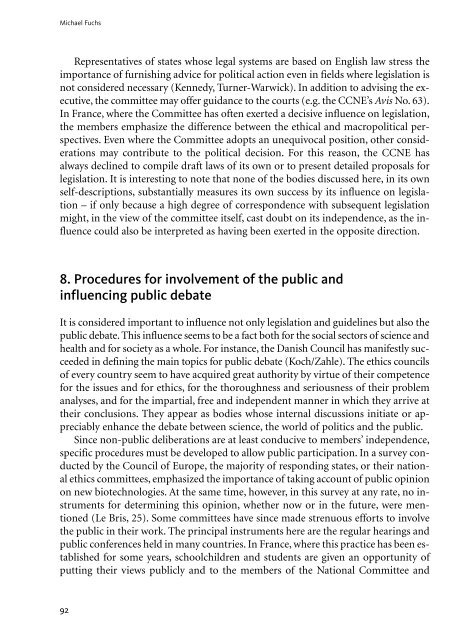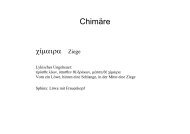Michael Fuchs National ethics councils - Deutscher Ethikrat
Michael Fuchs National ethics councils - Deutscher Ethikrat
Michael Fuchs National ethics councils - Deutscher Ethikrat
Create successful ePaper yourself
Turn your PDF publications into a flip-book with our unique Google optimized e-Paper software.
<strong>Michael</strong> <strong>Fuchs</strong> <strong>National</strong> <strong>ethics</strong> <strong>councils</strong>. Their backgrounds, functions and modes of operation compared<br />
Representatives of states whose legal systems are based on English law stress the<br />
importance of furnishing advice for political action even in fields where legislation is<br />
not considered necessary (Kennedy, Turner-Warwick). In addition to advising the executive,<br />
the committee may offer guidance to the courts (e.g. the CCNE’s Avis No. 63).<br />
In France, where the Committee has often exerted a decisive influence on legislation,<br />
the members emphasize the difference between the ethical and macropolitical perspectives.<br />
Even where the Committee adopts an unequivocal position, other considerations<br />
may contribute to the political decision. For this reason, the CCNE has<br />
always declined to compile draft laws of its own or to present detailed proposals for<br />
legislation. It is interesting to note that none of the bodies discussed here, in its own<br />
self-descriptions, substantially measures its own success by its influence on legislation<br />
– if only because a high degree of correspondence with subsequent legislation<br />
might, in the view of the committee itself, cast doubt on its independence, as the influence<br />
could also be interpreted as having been exerted in the opposite direction.<br />
8. Procedures for involvement of the public and<br />
influencing public debate<br />
It is considered important to influence not only legislation and guidelines but also the<br />
public debate. This influence seems to be a fact both for the social sectors of science and<br />
health and for society as a whole. For instance, the Danish Council has manifestly succeeded<br />
in defining the main topics for public debate (Koch/Zahle). The <strong>ethics</strong> <strong>councils</strong><br />
of every country seem to have acquired great authority by virtue of their competence<br />
for the issues and for <strong>ethics</strong>, for the thoroughness and seriousness of their problem<br />
analyses, and for the impartial, free and independent manner in which they arrive at<br />
their conclusions. They appear as bodies whose internal discussions initiate or appreciably<br />
enhance the debate between science, the world of politics and the public.<br />
Since non-public deliberations are at least conducive to members’ independence,<br />
specific procedures must be developed to allow public participation. In a survey conducted<br />
by the Council of Europe, the majority of responding states, or their national<br />
<strong>ethics</strong> committees, emphasized the importance of taking account of public opinion<br />
on new biotechnologies. At the same time, however, in this survey at any rate, no instruments<br />
for determining this opinion, whether now or in the future, were mentioned<br />
(Le Bris, 25). Some committees have since made strenuous efforts to involve<br />
the public in their work. The principal instruments here are the regular hearings and<br />
public conferences held in many countries. In France, where this practice has been established<br />
for some years, schoolchildren and students are given an opportunity of<br />
putting their views publicly and to the members of the <strong>National</strong> Committee and<br />
92<br />
Government representatives – and, what is more, a genuine discourse can come into<br />
being because such interventions are thoroughly prepared for with the support of the<br />
Committee and teachers. The German <strong>National</strong> Ethics Council, too, besides its annual<br />
public meeting, every year holds a number of public meetings and evening lectures<br />
(Forum Bioethik). In addition, since the beginning of 2003, the public have been<br />
admitted to plenary meetings of the Council as observers.<br />
Other approaches to promoting citizen participation, such as consensus conferences<br />
and similar citizens’ forums, are the responsibility of institutions other than the<br />
national <strong>councils</strong> in most countries (e.g. Denmark or Switzerland; for a comparison<br />
of <strong>ethics</strong> <strong>councils</strong> and citizens’ conference initiatives, see <strong>Fuchs</strong> 2001b).<br />
9. Funding, facilities and internal structure<br />
Except for the Nuffield Council, which is privately resourced and receives supplementary<br />
funding from the European Commission, the committees operate wholly or<br />
substantially with public funds. In some cases the committee or its secretariat is free<br />
to decide on the appropriation of resources, while in others funds must be obtained<br />
from the institution of state or authority to which the committee is answerable. The<br />
situation is similar for bodies under the auspices of academies of sciences or quasigovernmental<br />
research <strong>councils</strong>. Budget allocations are thus made in some cases in<br />
advance and in others on a post hoc basis. All committees reimburse members with<br />
their travelling expenses. In some instances funds are available for other expenses, per<br />
diems and meeting allowances. Further expenditure may be occasioned by hearings<br />
and the commissioning of external experts’ reports.<br />
Most bodies have a secretariat, which sometimes includes scientific staff. The scientific<br />
staff of the President’s Council is particularly worthy of mention because it is<br />
so numerous. An appreciable proportion of the costs of some <strong>ethics</strong> bodies is accounted<br />
for by the production and dissemination of publications and teaching material,<br />
as well as the holding of conferences and discussion forums. A particularity of<br />
the French Committee is the establishment of a large on-site documentation centre;<br />
other committees, such as those of Portugal and Belgium, have established smaller libraries<br />
or collections of essential reference works.<br />
The committees are very similar in their internal structures. In addition to their<br />
plenary meetings, which take place at four- to six-week intervals, they hold working<br />
and coordinating committee meetings. Additional expertise is often co-opted. The<br />
chair is sometimes elected by the body itself (as in the NBAC in the United States or<br />
the <strong>National</strong> Ethics Council in Germany) and in other cases appointed externally<br />
(e.g. in the French CCNE or the US President’s Council).<br />
93




